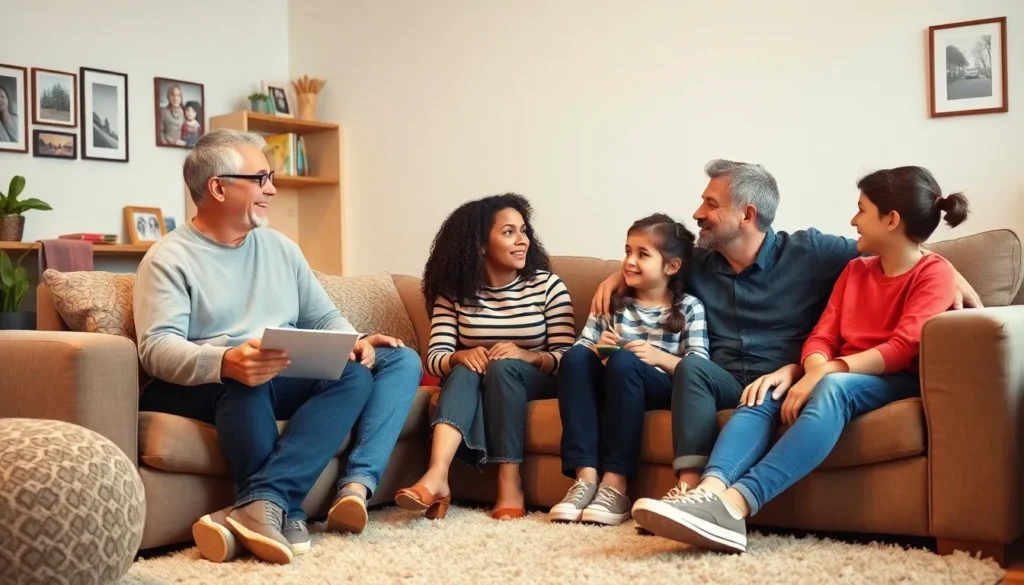When family life feels like a circus, juggling emotions and conflicts can leave everyone dizzy. Family dynamics counseling swoops in like a superhero, helping families untangle their knots and build stronger bonds. It’s not just about talking things out; it’s about transforming chaos into harmony—without the need for a magic wand.
family dynamics counseling
Family dynamics counseling focuses on understanding and improving the interactions within a family unit. It addresses challenges arising from communication issues, differing values, and unresolved conflicts. Families benefit from this counseling approach by gaining insight into their behaviors and relationships.
Professionals in this field utilize various techniques, including communication skills training and conflict resolution strategies. Counselors tailor sessions to identify specific issues, fostering a deeper understanding among family members. They aim to create a safe environment, encouraging open dialogue and active listening.
Participants often experience improved emotional expression and healthier relationship patterns. Through guided discussions, families learn to navigate challenges more effectively, enhancing their ability to work through disagreements. Strategies utilized during counseling sessions can lead to lasting positive change and strengthened family bonds.
The impact of family dynamics counseling can extend beyond immediate issues, influencing overall family functioning. Families learn to identify triggers and develop coping mechanisms that mitigate future conflicts. This proactive approach equips them with the tools needed to create a more harmonious home environment.
Counseling sessions typically involve all family members, as each person’s perspective contributes to the group dynamic. By acknowledging individual experiences, families can foster empathy and understanding. Overall, engaging in family dynamics counseling can transform chaos into unity, promoting resilience and connectedness within the family unit.
Importance of Family Dynamics Counseling

Family dynamics counseling plays a crucial role in fostering healthier family interactions. It encourages harmony and understanding within family units, offering tools to navigate the complexities of relationships.
Enhancing Communication
Effective communication stands at the core of family dynamics counseling. Families often struggle with expressing their feelings and needs. Counseling provides techniques to articulate thoughts more clearly, fostering open dialogue among members. Participants practice active listening, which enhances mutual respect. Training in communication skills helps individuals understand different viewpoints and emotions. As family members learn to express themselves respectfully, they minimize misunderstandings and build stronger connections. This enhanced communication lays the foundation for resolving deeper issues and improving overall familial relationships.
Resolving Conflicts
Conflict resolution skills form another essential aspect of family dynamics counseling. Families frequently face disagreements over various matters. Counselors guide families through structured methods that focus on resolving disputes constructively. Understanding the root causes of conflicts allows families to address issues instead of avoiding them. Techniques like role-playing encourage family members to see situations from different perspectives. Counseling promotes collaborative problem solving, enabling families to find agreeable solutions. Ultimately, this process not only resolves present conflicts but also equips families to handle future disagreements more effectively.
Techniques Used in Family Dynamics Counseling
Family dynamics counseling employs various techniques aimed at fostering healthier interactions among family members. Each method serves a unique purpose in addressing specific family challenges.
Structural Family Therapy
Structural family therapy focuses on the family as a whole, emphasizing the importance of family structure and organization. Therapists observe interactions and highlight patterns, identifying roles and boundaries that may contribute to dysfunction. They implement interventions that reshape these structures, establishing clearer roles among family members. By modifying interactions, families develop healthier dynamics and improve communication. This technique effectively addresses issues such as power imbalances and enmeshment, allowing families to create a more balanced environment conducive to open dialogue.
Narrative Therapy
Narrative therapy encourages families to explore their stories and the meanings they assign to experiences. This technique helps family members articulate their perspectives and understand their roles within the family narrative. Counselors facilitate discussions around personal and collective stories, enabling participants to reframe negative narratives into empowering ones. Families are guided to recognize their strengths and resourcefulness in overcoming challenges. Through this approach, individuals find new ways to engage with each other, fostering connections that promote empathy and understanding within the family unit.
Benefits of Family Dynamics Counseling
Family dynamics counseling offers several advantages that enhance relationships. Participants gain improved communication skills, making it easier to express feelings and needs. Active listening techniques encourage empathy, allowing family members to understand each other’s perspectives better.
Resolving conflicts becomes more manageable through structured interventions. Families learn to identify underlying issues that cause disagreements, fostering a deeper understanding among members. Techniques like role-playing allow individuals to step into one another’s shoes, cultivating compassion and reducing conflict escalation.
Emotional expression improves, leading to healthier patterns in relationships. Families often experience a notable shift in dynamics, with members feeling more connected and supported. Creating a safe space for open dialogue strengthens trust within the family unit.
Counseling also equips families with coping mechanisms for future challenges. Recognizing triggers and developing strategies to handle them empowers families to navigate conflicts independently. Skills acquired during sessions promote resilience and adaptability, essential traits for long-term harmony.
Therapies such as Structural Family Therapy and Narrative Therapy provide unique benefits. Structural Family Therapy focuses on re-establishing healthy roles and boundaries, promoting organization within the family. Narrative Therapy encourages families to explore their stories, allowing them to reshape negative experiences into positive narratives.
Ultimately, family dynamics counseling fosters lasting bonds and unity. By prioritizing effective communication and conflict resolution, families create an environment conducive to growth and understanding. The overall impact supports healthier interactions and enhances familial relationships over time.
Conclusion
Family dynamics counseling serves as a vital tool for families seeking to improve their relationships and navigate conflicts. By fostering open communication and understanding, it transforms chaotic interactions into harmonious connections. The techniques employed by counselors not only address immediate issues but also equip families with skills to handle future challenges.
Through structured methods and tailored approaches, families learn to articulate their feelings and develop empathy. This process enhances emotional expression and cultivates healthier patterns of interaction. Ultimately, family dynamics counseling lays the foundation for lasting bonds and resilience, ensuring families can thrive together in a supportive environment.



